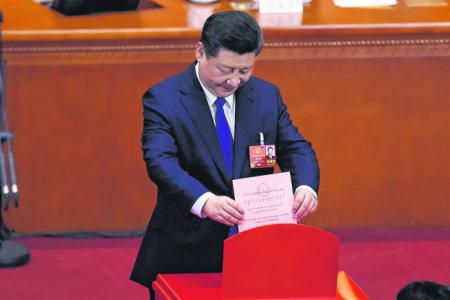China's Parliament approves by 99.79% to remove Xi's term limits
Xi, once a banished teen, is now the indefinite leader
BEIJING Mr Xi Jinping has joined the pantheon of Chinese leadership two decades after bursting onto the scene as a graft-fighting governor who went on to earn comparisons with Mao Zedong in his quest for unrestricted power.
The rubber-stamp Parliament further enhanced Mr Xi's considerable power yesterday when it approved - by 99.79 per cent of votes - a constitutional amendment abolishing presidential term limits.
The move allows the 64-year-old to remain in power for as long as he wishes and is the latest feather in the cap of a communist "princeling" who is re-making China in his own image.
Mr Xi, who was given a second term as the party's general secretary at the party congress in October, has amassed seemingly unchecked power and a level of officially stoked adulation unseen since communist China's founder Mao.
Even though his father Xi Zhongxun - a revolutionary hero turned vice-premier - was purged by Mao during the Cultural Revolution and Mr Xi himself sent to work in the countryside during the tumultuous times, he has remained true to the party.
He is the first Chinese leader to have been born after 1949, when Mao's communist forces took over following a protracted civil war.
His father's purging led to years of difficulties for the family but he rose through the ranks.
Starting as a county-level party secretary in 1969, Mr Xi climbed to the governorship of coastal Fujian province in 1999, then party chief of Zhejiang province in 2002 and Shanghai in 2007. That year, he was appointed to the Politburo Standing Committee, the apex of political power in China.
Following Mao's disastrous economic campaigns and the bloody 1966-1976 Cultural Revolution, the communist leadership sought to prevent further chaos by tempering presidential power through a system in which major decisions were hashed out by the ruling Politburo Standing Committee.
The move helped prevent political power from becoming too concentrated but was also blamed for policy indecision that led to growing ills, such as worsening pollution, corruption and social unrest.
But "Xi Dada" ("Big Uncle Xi"), as he has been dubbed by propaganda, has broken with that tradition since taking over as president in 2013, and he looms over the country in a deepening cult of personality.
He has used crackdowns on corruption and calls for a revitalised party to become the most powerful Chinese leader in decades.
Fighting graft and upholding party leadership were already central to him when he spoke to AFP in 2000.
At the time, Mr Xi vowed to root out corruption following a US$10 billion (S$13 billion) smuggling scandal but ruled out political reform, saying he would work within the one-party structure and system of political consultation and "supervision by the masses".
"The people's government must never forget the word the 'people', and we must do everything we can to serve the people, but to get all the government officials to do this is not easy.
"In some places this is not done very well and in other places it is done badly," Mr Xi had told AFP.
His face now graces the front page of every paper in the country, while his exploits and directives headline the evening news.
Shops sell memorabilia with his image alongside Mao's, and he has accumulated so many political and military titles - from president to Central Military Commission chairman - that he has earned the nickname "Chairman of Everything".
Mr Xi has also cultivated a personal image as a man of the people who dresses modestly and buys his own steamed buns at an ordinary shop.- AFP
Get The New Paper on your phone with the free TNP app. Download from the Apple App Store or Google Play Store now




